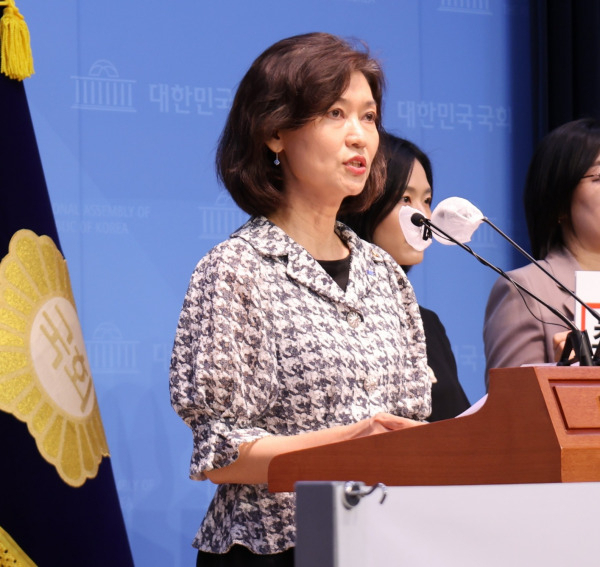 |
Rep. Kang Kyung-sook of the Rebuilding Korea Party speaks at a press conference on Monday. (Office of Rep. Kang Kyung-sook) |
In a move that highlights the seriousness of the country’s college admission competition, a South Korean lawmaker proposed Monday a ban on private academies tutoring elementary students for medical college admission.
Announcing the submission to the National Assembly of the bill, Rep. Kang Kyung-sook said the law was failing to protect children from the unbridled growth of private tutoring academies, known as hagwon, that teach subjects like calculus as early as five years ahead of the public school curriculum.
"Extreme levels of prior learning provided by private education institutes are causing even ordinary parents to feel anxious, prompting them to engage in the private education sector," the lawmaker from the minor opposition Rebuilding Korea Party said at a press conference at the National Assembly building in Seoul.
She stressed such private education jeopardizes the integrity of public education and only drives up the costs associated with private education.
Activist Shin So-young from civic group World Without Worry About Private Education, who was also present at the press conference, said that there are at least 136 private academies nationwide, located in all provinces except for Jeju, that offer med school prep classes for elementary school students.
According to Rep. Kang, the proposed bill aims to amend the Special Act on the Promotion of Public Education Normalization and Regulation of Pre-Curriculum Education, enacted in 2014, which does not clearly ban or penalize hagwon that promote enrollment in courses that run far in front of the standard school curriculum.
The revision aims to provide a legal foundation to regulate private education that could hinder children’s normal development.
The idea of banning teaching ahead of the curriculum is not new in South Korea, where parents are eager to give their children a head start in their education.
When the above-mentioned special act took effect in 2018, it had prohibited elementary schools nationwide from offering extra English classes for first- and second-grade students, since English is taught officially only from grade 3. After facing strong public backlash, however, the act was revised to legalize after-school English education again.
Rep. Kang’s proposal comes as a medical school craze grips South Korean education, with medical school remaining unchallenged as the most sought-after destination for high-achieving students, offering both high social status and lucrative salaries.
The race for medical school admissions only intensified, after South Korean government's initiative to increase the medical enrollment quota. The move has faced strong backlash from junior doctors, leading to nationwide disruptions in medical services.







